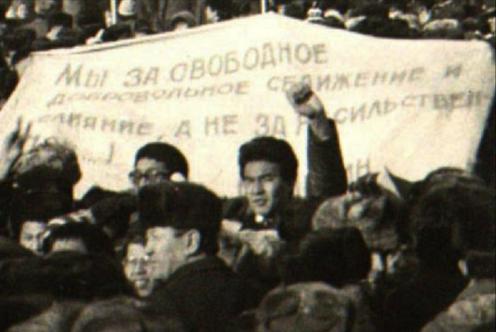 Demonstration of Kazakh youth on Brezhnev Square, now Republic Square. Almaty, December 1986. Photocopy from the Central State Archive of Almaty
Demonstration of Kazakh youth on Brezhnev Square, now Republic Square. Almaty, December 1986. Photocopy from the Central State Archive of Almaty
A court in Aktobe, a city in western Kazakhstan, has recognized a local resident as a victim of political repression related to the December 1986 events known as Zheltoksan (“December”), the press service of the country’s Supreme Court reported on June 20.
According to the case materials, in 1985 the plaintiff was a student in the philosophy and economics faculty at Kazakh State University. A year later, he was expelled in his second year on the grounds of alleged public disorder. The basis for expulsion was his detention by law enforcement on December 18, 1986, on suspicion of participating in the December protests—though no charges were filed.
Despite being released, the student was expelled from the Communist Party of the Soviet Union (CPSU), faced ongoing persecution, and was unable to find employment. His wife, a graduate of the same university’s philosophy faculty, also encountered repeated job rejections for similar reasons, the court statement said.
Between 1990 and 1993, the family, then with three young children, had to rent housing and lived in a socially vulnerable condition.
In 2025, nearly four decades after the December events, the now 64-year-old man filed a claim to be officially recognized as a victim of political repression. The court confirmed that he had indeed participated in the 1986 demonstrations and had faced persecution, including being denied employment rights. These facts were supported by archival records from the university and Almaty’s prosecutor’s office, as well as witness testimony.
“Guided by Article 306 of the Civil Procedure Code and Article 2 of the Law On the Rehabilitation of Victims of Mass Political Repression, the court recognized the plaintiff as a victim of political repression related to the 1986 events,” the Supreme Court stated. The ruling has already entered into force.
Kazakhstan’s Law On the Rehabilitation of Victims of Mass Political Repression has been in effect since 1993, as Tengrinews.kz notes. Since 2023, those recognized as victims receive one-time compensation and monthly benefits. The status also gives priority access to social services.
In December 1986, Almaty was gripped by mass youth protests triggered by the Politburo’s decision to replace Dinmukhamed Kunaev, the First Secretary of the Communist Party of Kazakhstan, with Gennady Kolbin—a man who had never lived or worked in the Kazakh SSR. The demonstrations, centered on the city’s main square, were violently suppressed. Over 1,700 people were injured. One activist, Kairat Ryskulbekov, died in a KGB detention center—officially ruled a suicide. Hundreds of participants were expelled from educational institutions, and many were fined.









